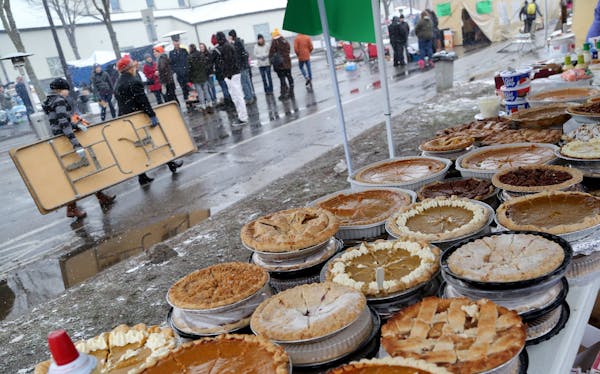One by one, people filed somberly past the open casket at the foot of the pulpit, some in their Sunday best, others wearing airbrushed T-shirts and hoodies that read "Rest in Power, Jamar Clark."
They were there to celebrate Clark's 24 years of life, most of it spent on Minneapolis' North Side, his name largely unknown outside the tight-knit community that, several speakers noted, sees too many senseless deaths.
That anonymity disappeared Nov. 15 when Clark was shot by Minneapolis police as he scuffled with officers. His death has reverberated nationwide and spurred more than a week of protests in north Minneapolis.
"Jamar, your life did and does have purpose," said Bishop Richard Howell, pastor at Shiloh Temple International Ministries, where more than 300 people came to pay their respects Wednesday afternoon. "Your death is not in vain; we will fight with the tools you have provided."
Howell commended the hundreds of protesters who have camped out at the Fourth Precinct police station since the shooting. Their demands for an independent investigation of the circumstances of the shooting and the release of the officers' names have been met, he said.
"Our presence before the Fourth Precinct has brought us a significant victory," he said during the funeral.
Howell called on the protesters to "enlarge the agenda" and shift their focus toward a possible special legislative session that could include steps to address the lagging economic and social conditions among black people in Minnesota.
Others, including U.S. Rep. Keith Ellison, who attended the funeral, have praised the protesters' efforts while urging them to end the daily demonstrations at the police station.
"Protestors and activists should continue to push for systemic change in Minnesota, but it's time for the protest occupying the Fourth Precinct to evolve beyond the encampment," Ellison said in a statement Wednesday afternoon. "The changes we seek will likely take years, not weeks or months."
Clark was taken off life support Nov. 16, less than 24 hours after being shot by police who had responded to a disturbance call in front of his sister's apartment building in the 1600 block of Plymouth Avenue N. An autopsy showed he died of a gunshot wound to the head.
Police have said Clark, who was unarmed, was interfering with paramedics tending to his girlfriend, the victim of an assault. A police union leader said Clark reached for an officer's gun during the ensuing scuffle. Witnesses have said Clark was handcuffed and on the ground when he was shot.
State and federal authorities have launched parallel investigations. The officers involved, Mark Ringgenberg and Dustin Schwarze, are on paid leave.
'We all matter'
At the visitation, leaflets shared details about Clark, the youngest of 10 children, whose nickname was "Dizzy" and who liked to swim, fish and listen to music.
"As a child, Jamar was always full of energy and had a big smile," the leaflet said.
Before the service began, a slide show of Clark's youth was projected on two screens that flanked the stage, while music from the rapper Big Sean played in the background. As relatives made their way to the casket where Clark lay dressed in a red checkered shirt, his hair braided neatly back, several became emotional. Tears streamed down the face of one woman, and her body convulsed so violently that several people rushed to her side.
The church filled with community leaders and politicians, including state Sen. Bobby Joe Champion, DFL-Minneapolis, and former Minneapolis mayors R.T. Rybak and Sharon Sayles Belton.
Leaders of the Black Lives Matter protests, Police Chief Janeé Harteau and Mayor Betsy Hodges did not attend. Clark's older brother told the funeralgoers that Hodges sent her condolences, then added that he thought she had failed to hold the police officers accountable. "We just want her to do her job," James Hill said.
Listening in the first several rows were many members of Clark's family, including his 24-year-old cousin Cameron Clark, who hobbled into the church on crutches after being wounded in the leg Monday in an apparently racially motivated shooting near the protest outside the Fourth Precinct station. Sitting nearby was Clark's adoptive mother, Wilma, who dabbed her eyes with a tissue as Hill spoke.
Several speakers said Clark, who overcame a tumultuous childhood and adolescence, had not died in vain. He had a criminal record, but friends and family members said he had begun to turn his life around.
Growing up, he spent several summers at a Christian camp with Jean Peglow, a former North Side elementary school teacher, and her husband, Brad. She remembered him as a smiling, energetic boy who horsed around with his friends. The couple often took Clark in on the weekends to give his parents a break at home. "Jamar was just one of those kids that stuck out in my heart my whole life," Peglow said by phone this week from her home in Arizona. "Even the battles that we go through, it was bonding."
At the funeral, one of Clark's sisters, Javille Burns, thanked Black Lives Matter for avoiding violence in its protests. "I know that if my brother were here right now, he'd be smiling ear to ear, looking at the movement," said Burns, who wore a white shirt with "I Matter" in black letters. "We all matter."
When the service ended, the funeral procession made its way to the Fourth Precinct station. A line of about 100 protesters held their fists in the air as the mourners' cars drove past. Those in vehicles responded by poking their fists out the windows.
When the procession had passed, the protesters gathered in a circle and observed a moment of silence for Clark.
Libor Jany • 612-673-4064

Marijuana's path to legality in Minnesota: A timeline
U.S. Steel won't get exception to pollution rules that protect wild rice, MPCA says

Taste of Minnesota to be enjoyed on the ground and in the air this year

Ex-Hennepin sheriff paid for drunk-driving damages with workers' comp

